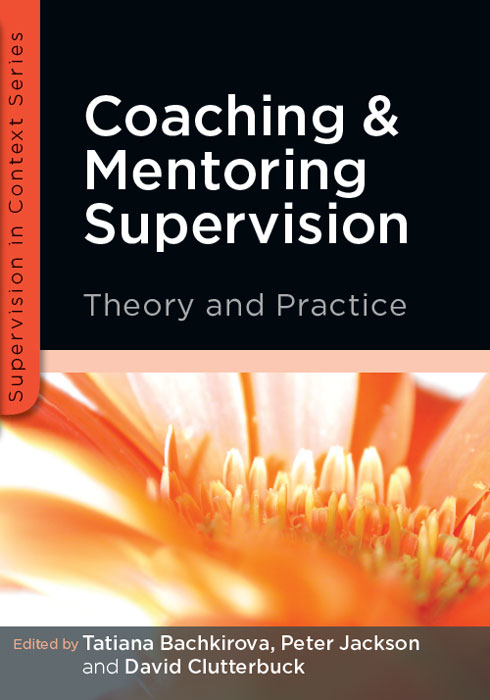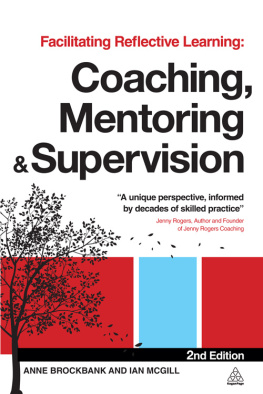Tatiana Bachkirova - Coaching And Mentoring Supervision: Theory And Practice
Here you can read online Tatiana Bachkirova - Coaching And Mentoring Supervision: Theory And Practice full text of the book (entire story) in english for free. Download pdf and epub, get meaning, cover and reviews about this ebook. year: 2011, publisher: McGraw-Hill Education, genre: Home and family. Description of the work, (preface) as well as reviews are available. Best literature library LitArk.com created for fans of good reading and offers a wide selection of genres:
Romance novel
Science fiction
Adventure
Detective
Science
History
Home and family
Prose
Art
Politics
Computer
Non-fiction
Religion
Business
Children
Humor
Choose a favorite category and find really read worthwhile books. Enjoy immersion in the world of imagination, feel the emotions of the characters or learn something new for yourself, make an fascinating discovery.

- Book:Coaching And Mentoring Supervision: Theory And Practice
- Author:
- Publisher:McGraw-Hill Education
- Genre:
- Year:2011
- Rating:5 / 5
- Favourites:Add to favourites
- Your mark:
- 100
- 1
- 2
- 3
- 4
- 5
Coaching And Mentoring Supervision: Theory And Practice: summary, description and annotation
We offer to read an annotation, description, summary or preface (depends on what the author of the book "Coaching And Mentoring Supervision: Theory And Practice" wrote himself). If you haven't found the necessary information about the book — write in the comments, we will try to find it.
A definitive text covering the latest thinking, models and approaches from expert practitioners in coaching and mentoring supervision.
Coaching And Mentoring Supervision: Theory And Practice — read online for free the complete book (whole text) full work
Below is the text of the book, divided by pages. System saving the place of the last page read, allows you to conveniently read the book "Coaching And Mentoring Supervision: Theory And Practice" online for free, without having to search again every time where you left off. Put a bookmark, and you can go to the page where you finished reading at any time.
Font size:
Interval:
Bookmark:

Coaching and Mentoring Supervision Theory and Practice
Supervision in Context series
Coaching & Mentoring Supervision: Theory and Practice by Tatiana Bachkirova, Peter Jackson and David Clutterbuck
Skills of Clinical Supervision for Nurses: A Practical Guide for Supervisees, Clinical Supervisors and Managers (Second Edition) by Meg Bond and Stevie Holland
The Social Work Supervisor: Supervision in Community, Day Care, and Residential Settings by Allan Brown and Iain Bourne
Psychotherapy Supervision: An Integrative Rational Approach to Psychotherapy Supervision by Maria C. Gilbert and Kenneth Evans
Forthcoming in 2012:
Supervision in Action: A Relational Approach to Coaching and Consulting Supervision by Erik de Haan
Supervision in the Helping Professions (Fourth Edition) by Peter Hawkins and Robin Shohet
Clinical Supervision in the Medical Profession: Structured Reflective Practice by David Owen and Robin Shohet
Coaching and Mentoring Supervision Theory and Practice
Edited by
Tatiana Bachkirova, Peter Jackson and David Clutterbuck

Open University Press
McGraw-Hill Education
McGraw-Hill House
Shoppenhangers Road
Maidenhead
Berkshire
England
SL6 2QL
email:
world wide web: www.openup.co.uk
and Two Penn Plaza, New York, NY 10121-2289, USA
First published 2011
Copyright Tatiana Bachkirova, Peter Jackson and David Clutterbuck 2011
All rights reserved. Except for the quotation of short passages for the purposes of criticism and review, no part of this publication may be reproduced, stored in a retrieval system, or transmitted, in any form or by any means, electronic, mechanical, photocopying, recording or otherwise, without the prior written permission of the publisher or a licence from the Copyright Licensing Agency Limited. Details of such licences (for reprographic reproduction) may be obtained from the Copyright Licensing Agency Ltd of Saffron House, 6-10 Kirby Street, London, EC1N 8TS.
A catalogue record of this book is available from the British Library
ISBN-13: 9780335242986 (pb) 9780335242979 (hb)
ISBN-10: 0335242987 (pb) 0335242979 (hb)
e-ISBN: 9780335242993
Library of Congress Cataloging-in-Publication Data
CIP data applied for
Typeset by Aptara
Printed in the UK by Bell and Bain Ltd, Glasgow
Fictitious names of companies, products, people, characters and/or data that may be used herein (in case studies or in examples) are not intended to represent any real individual, company, product or event.

We welcome this excellent new addition to the Supervision in Context Series. Supervision of coaches, mentors and consultants has grown up more recently than supervision in many of the people professions such as counselling, psychotherapy, psychology, social work and nursing. Although a minority of coaches had been receiving supervision for many years, this was mostly delivered by supervisors trained in counseling, psychotherapy or psychology and supervision in coaching lacked its own distinctive approach, relevant to its own unique challenges. This lack of specific coaching supervision was a major factor, as many in the field were reluctant to take up supervision and there was a good deal of resistance to its development (Hawkins and Schwenk 2006). It did not help address what the authors of this book describe as the blurred boundary between coaching and counseling. The first research and the first book specifically on supervision for coaches, mentors and consultants was not published until 2006 (Hawkins and Smith 2006) and the first training specifically for supervisors of coaches and mentors did not start until 2003. Yet in the last ten years much has been done to develop this fast growing field, of which this book is the latest very welcome addition. This book brings together a remarkably rich array of contributions. These show how supervision has developed for coaches in a wide range of European countries (specifically UK, France, Denmark and Switzerland), for internal and external coaches; for mentors and consultants, and for those coaching individuals, groups, teams and wider systems.
Coaching supervision draws on many of the supervision models and approaches developed in other professions, as David Gray and Peter Jackson illustrate in chapter 1.1, and each of the chapters in section two elucidate. However, supervision of coaches has significant differences from those supervising other helping professionals. Whereas the counselor, nurse, or social worker have clear individual and group clients that they bring to supervision, those who are carrying out executive coaching, paid for by organizations, always have to serve multiple clients. Those coaching managers and leaders in organizations have the challenge of serving the individual coaching client, the organization in which the coaching takes place and the relationship between the two. It is all too easy for the coach to be more focused on the individual they are with in the coaching room and pay less attention to the organization and yet this organization has an investment in the coaching relationship and its outcomes. When the coach comes to supervision, the supervisor needs to hold in mind the coach and their development, the coach's individual and team clients, the organizations investing in the coaching and the systemic connection across all these different entities. This requires a sophisticated, systemic and sensitive form of supervision.
Tatiana, Peter and David also point out other extra challenges for the coach supervisor; namely that coaches are often less well trained to identify mental-health issues impinging on the boundaries of coaching; and less prepared to identify the effect of their personal process on their work because they are not required to undertake counseling or other personal development. These put extra responsibility on the coaching supervisor who needs to combine expertise on the coaching craft, understanding of adult development and psychological process, a wide ranging understanding of business, systems and organizational dynamics. This requires specific supervision skills on top of the coaching skills they will have already acquired.
One of the great strengths of this particular book is that Tatiana, Peter and David have brought together contributions from practice, teaching and research as well as the growing body of theory in the field, while providing a lively and practical text that help both the new coaching supervisor and those who have been practicing for many years.
This new edition sits proudly alongside the other books in this series, which include:
Supervision in the Helping Professions by Peter Hawkins and Robin Shohet (now in its 3 rd edition)
Clinical Supervision for Nurses by Meg Bond and Susie Holland (now in its 2 nd edition)
The Social Work Supervisor , by Allan Brown and Iain Bourne,
Psychotherapy Supervision by Maria Gilbert and Ken Evans.
Shortly we will adding to this series with new books on Supervision in Medical Settings edited by David Owen and Robin Shohet and a book on Supervision in Schools by Elizabeth Holmes.
This whole series focuses on how to create, develop and sustain helping relationships, through providing quality supervision to those who work broadly in the people and helping professions. Quality supervision is the key link in helping practitioners link what they learn in theory, with what they learn and do in practice and is therefore the core of all continuous personal and professional development. At its best it serves and benefits the professional being supervised, their clients, the organizations in which they work (and work for) and the development of the profession. In today's world no helping professional can afford to be without supervision and this book also provides an excellent frame for coaches, mentors and consultants to know what they should be demanding as part of sustaining the quality and development of their practice.
Font size:
Interval:
Bookmark:
Similar books «Coaching And Mentoring Supervision: Theory And Practice»
Look at similar books to Coaching And Mentoring Supervision: Theory And Practice. We have selected literature similar in name and meaning in the hope of providing readers with more options to find new, interesting, not yet read works.
Discussion, reviews of the book Coaching And Mentoring Supervision: Theory And Practice and just readers' own opinions. Leave your comments, write what you think about the work, its meaning or the main characters. Specify what exactly you liked and what you didn't like, and why you think so.





